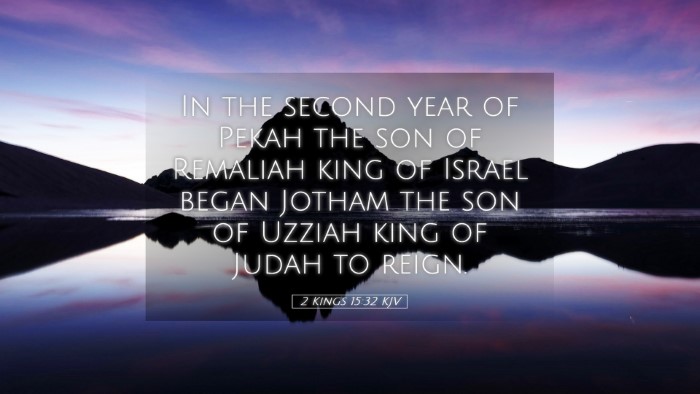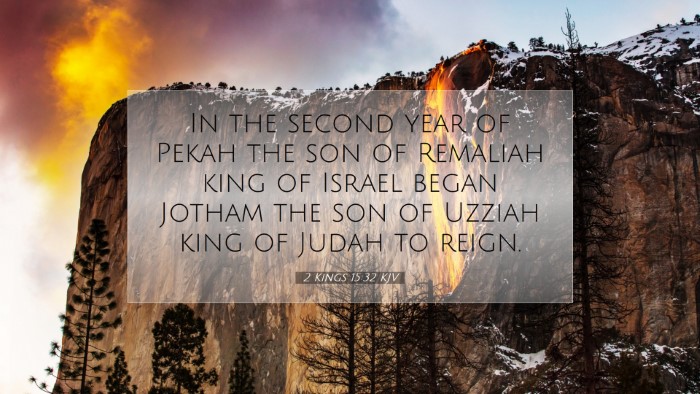Commentary on 2 Kings 15:32
Introduction: 2 Kings 15:32 states, “In the second year of Pekah the son of Remaliah, king of Israel, began Jotham the son of Uzziah king of Judah to reign.” This verse introduces Jotham, who serves as a bridge between the reign of his father, Uzziah, and his son, Ahaz. Understanding Jotham’s reign provides crucial insights into the spiritual and political landscape of Judah during a tumultuous period.
Historical Context
Seeking Stability Amidst Division: The passage occurs during a time of national division and moral decline in Israel and Judah. Pekah’s reign in Israel was characterized by sin and idolatry, which stands in stark contrast to Jotham’s efforts to maintain a semblance of fidelity to Yahweh.
Insights from Commentators
Matthew Henry
Matthew Henry notes that Jotham’s ascension to the throne was significant not just because he was the son of a well-regarded king, Uzziah, but also due to the political challenges he inherited. He emphasizes that Jotham continued his father’s work in trying to maintain a righteous path amidst the prevailing idolatry.
- Jotham’s Character: Henry highlights Jotham as a king who did what was right in the sight of the Lord, although he did not remove the high places for sacrifice (2 Kings 15:35). This reflects a partial faithfulness which was typical of kings during this period.
- The Importance of Governance: The commentary underscores the notion that Jotham’s reign was marked by a commitment to justice and rightful governance, evidenced by his focus on repairing the temple and upholding the law.
Albert Barnes
Albert Barnes provides a deeper examination of Jotham’s timing and lineage. He points out that the context of Jotham's reign needs to be understood against the political instability in Israel due to the internal strife and conflicts with Syria.
- Syrian Influence: Jotham's reign does not occur in a vacuum; he was contemporaneous with significant threats from Syria and Israel, which influenced his policies and military actions.
- Theological Reflections: Barnes draws attention to the theological implications, regarding how leaders influence the spiritual state of their people. Jotham’s obedience to God, even if not fully eradicating idolatry, had spiritual ramifications for Judah.
Adam Clarke
Adam Clarke elaborates on the meaning of Jotham’s name, which means “Yahweh is perfect.” He connects the meaning of his name with his character and actions as a king, suggesting that a leader’s character often reflects the name they bear.
- Worship Practices: Clarke asserts the continuation of high places for worship represents a flaw in Jotham’s reign. Although his heart was aligned with God, the lingering high places were a compromise that had lasting effects on the nation’s spiritual condition.
- Judah’s Political Climate: He highlights Jotham’s attempts to negotiate peace and stability in Judah, asserting that even in tumultuous times, a leader’s faithful stewardship is pivotal.
Theological Reflections
Jotham's reign serves as a reminder of the importance of leadership in the nation of Judah. Theological insight draws attention to the idea that leaders bear a significant responsibility for the spiritual direction of their people.
- Commitment to God: Jotham's partial obedience emphasizes the necessity of wholeheartedness in faith. Compromise in devotion can have detrimental effects on the community at large.
- Warnings from History: The truths offered by Jotham’s reign resound through the ages, serving as warnings against the apathy and complacency that can easily infiltrate the faithful community.
Conclusion
In summary, 2 Kings 15:32 offers a multifaceted view of leadership in ancient Israel. The insights gained from Matthew Henry, Albert Barnes, and Adam Clarke highlight the complexity of Jotham's reign as he strived to uphold God's standards amidst a divided and idolatrous nation. These lessons remain relevant for today's church leaders and scholars as they study the national identity and the spiritual state of modern nations.


